David Payne
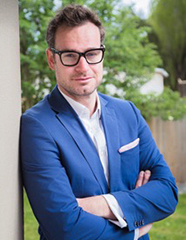 What led you to OAMU?
What led you to OAMU?
Like everyone who takes any of Otago's Aviation or Occupational Medicine papers, I started by dipping my toe in the water and never really stopped. Before Medicine I read Physiology at university in England. I came to New Zealand as a PGY2 and in my house surgeon years I was looking for a course in Scuba Dive medicine. Googling led me to OAMU but the only paper on offer that year was an Aviation Medicine one. So I signed up as I figured the principles would be the same, just in reverse! I was then doing anaesthetics in the hospital but since then have trained as a GP and am now an advanced registrar in the RACP Occupational and Environmental Medicine training program. In the interim I have completed the Diploma in Occupational Medicine and the Masters in Aviation Medicine and am part way through a Diploma in Aeromedical Retrieval.
How did you find learning via distance?
The joy of the Otago courses is that they are flexible and you can fit them around life, work and travel. They also intertwine medicine and the real world, something I found lacking in hospital clinical practice. As a consequence the courses and the job opportunities that open up are really interesting and enjoyable. Currently I am the Medical Advisor to a Mining Company and also do Aviation Medicals for a number of pilots who fly worldwide – a huge privilege. Put simply I would not be doing this if it were not for OAMU.
Outside of Medicine I love to travel and visit new places, both in New Zealand and abroad. With Aviation Medicine, I can incorporate travel and work and am hugely looking forward to the PVP in Lisbon in 2019. I am also (very) slowly learning to fly – with the long term dream of flying a float plane in Alaska.
Peter Clem
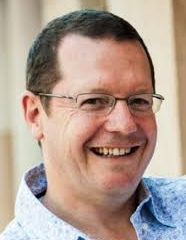
I originally started out studying Science at the University of Queensland in the 1980s. I was interested in Medicine, but also Aviation, and at that time wasn't sure which way to go.
I was intending to go on a gap year after science, but made an application to the Australian Air Force before departing, expecting that the process would take at least a year. As it turned out, before I could go to London, I got a letter saying I had to be in Point Cook in 4 weeks' time. So I spent the 1990s training, flying the Hercules transport and then becoming a Flying Instructor myself.
I was still interested in Medicine and enjoyed my various Aviation Medicine courses at the Australian Institute of Aviation Medicine. So when my service obligation was completed, I resolved to take up a contract in Saudi Arabia as a Flying Instructor in order to finance my return home to study Medicine.
I loved the study and went on to a GP Fellowship. I worked with the Australian Defence Force again as a GP and was offered the chance to undertake Aviation Medicine training again, but this time as a Doctor. In 2012 a job became available at the Australian Civil Aviation Safety Authority in their Aviation Medicine section. Since then, I have been mostly working full time with CASA since 2012 with some part-time GP work.
What led you to OAMU?
When I joined CASA I was fortunate enough to be mentored by OAMU alumni and lecturers. So I was inspired to undertake the course and follow the example that they had set in performing this complex work.
What have you enjoyed about our programme?
I absolutely loved the Professional Visits Programme to Taipei in 2018. It was such a wonderful time meeting the other students, the teaching staff and visiting the sites. It is something I will always treasure both professionally and personally. The insights into how other Medicos perform the work that I do were invaluable to me.
How did you find learning via distance?
This was the first time I have ever undertaken distance learning. I have to admit that it was harder for me than previous study, particularly in the first six months, and mostly with the assignments.
The study itself, the tutorials and presentations were great and I really enjoyed these. The technology for the on-line meetings is superb. I did adapt over time and got better with managing my assignments, though I did have to make some changes to how I programmed my study and my other work.
Angela Ernst
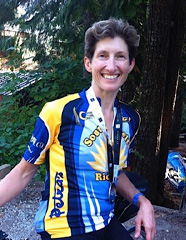
- Currently completing: Postgraduate Diploma in Occupational Medicine & Masters of Aviation Medicine
- Lives in Vancouver, Canada
- Family Practice/General Practice
What led you to OAMU?
About 7 years ago I left my traditional family practice in order to work in a travel medicine clinic and at the Vancouver International Airport occupational medicine clinic. I liked the aviation and occupational setting so much that I thought I would explore, in the latter half of my career, educational and training opportunities in this area – hence, my interest in the unique University of Otago AvMed programme.
What have you enjoyed about our programme?
In the AvMed programme I have enjoyed the intellectual challenges, finally learning how to use PowerPoint, swapping editing roles with my student daughter (who knew punctuation could be so complicated?), and of course meeting delightful people from all over the world. The highlight of the Calgary PVP was getting to know fellow students and teachers; the lowlight was receiving a photo radar speeding ticket in the mail when I got home.
Tom Hyland
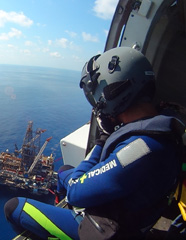
- 2015 - Completed Postgraduate Diploma in Health Sciences with Credit endorsed in Aeromedical Retrieval and Transport
- Lives in Perth, Australia and Broome, Australia
- Role: Flight Paramedic and Rescue Crewman
Why did you choose OAMU?
I heard of the OAMU programme from the Westpac boys in Auckland. They were either completing or teaching the AVME papers and told me to get involved. I guess it kind of led me towards my current job, which I love.
What have you enjoyed about our programme?
The most outstanding part of this programme is the range of specialities that can be brought to the class from all over the world. From the experiences of the tutors, to doctors who are in management roles of massive airline corporations or specialist wards, those in metropolitan Hems, to rural nurses, or those just starting out in the aeromedical industry. Everyone can contribute and provide feedback and I am constantly surprised or amazed at the information that is provided. I've also been on a fixed wing retrieval with a class member, by sheer luck - so you'll never know who you'll run into.
What has been your motivation for "sticking with it" even when things got tough?
I am constantly reminded of the importance to excel and become better, and ultimately 'practice what we preach'. The minimum amount of time we can get a patient from time of injury to definitive care is approximately 6 hours. That's a long time to transport and care for someone who is critical… and it's this reality that is all the motivation I need.
Eddie Callachan
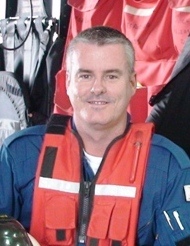 Eddie Callachan is one of our alumni students, who studied from the United Arab Emirates.
Eddie Callachan is one of our alumni students, who studied from the United Arab Emirates.
- With the OAMU: 2006-2010
- Studied from: Abu Dhabi, UAE
- Role: Flight paramedic
- Prior qualifications: National Diploma Ambulance and Emergency Care (1996)
- Studied towards:
- PGCertHealSc (AeroRT)
- PGDipHealSc (AeroRT)
- MHealSc (AeroRT)
Why did you choose UOW?
Otago is widely known as a leader in aviation and retrieval medicine education. Very few programmes around the world offered air medical care and transport as a tertiary qualification. It was easy for allied health professionals to apply, for example paramedics who want to combine education in a field that essentially only offers certificates on attendance, and no University coursework. It also allowed paramedics to obtain a post graduate qualification in this field: many paramedics hold an undergraduate degree, but are sometimes pressed for an interesting postgraduate qualification.
Faculty were well known as experts in their field. The initial application process as a foreign qualified paramedic (South Africa) was also very easy. My certification was evaluated for equivalency and the university suggested a study path for me, knowing that my end goal was a Masters Degree. Their suggested path was spot on: it eased me through not only the aeromedical care aspects, but also academic writing and research as well.
How did you find learning via distance?
Easy do to and convenient as I was in full time employment at the time. Was nice to work at my own pace, and any issues were quickly addressed by lecturers. I was also able to do my final research project locally in the UAE, which made distance learning the ideal choice in the end.